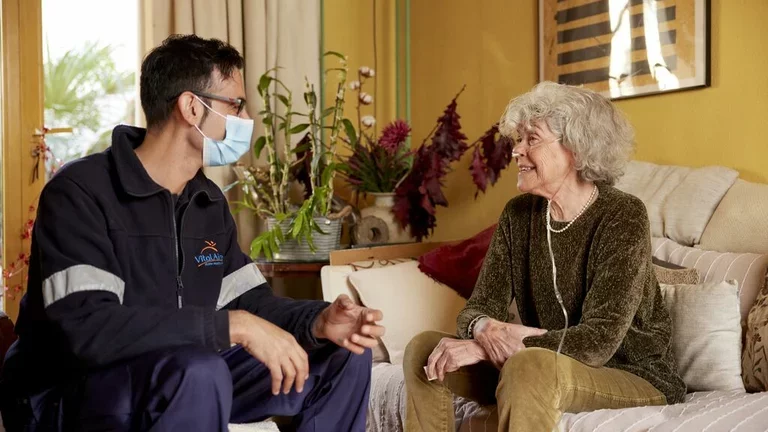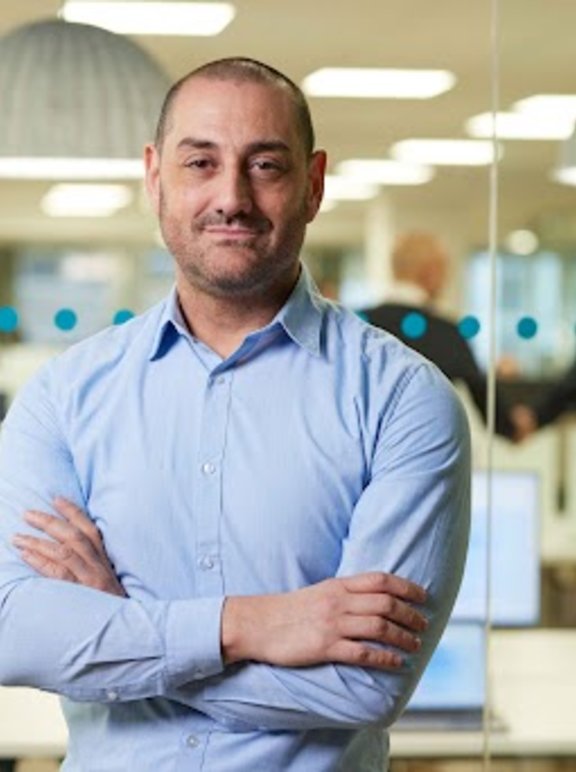"My life has changed", says Margaret Watty, a lively, independent-minded woman who is living with chronic obstructive pulmonary disease, a condition that results in severe breathing difficulty.
Her gratefulness is palpable as we sit together in the warm, sunny living room of her Madrid apartment. “Before, I couldn’t go out – I could hardly walk.” After two bouts with covid-19, she now requires oxygen therapy 24 hours a day.
David Rudilla, Air Liquide Healthcare’s Director of Patient Quality of Life and a psychologist, is on-site with us today. He is part of a multidisciplinary team of nurses, technicians, doctors and pharmacists who help patients like Margaret cope with living with a range of chronic conditions. “I am passionate about placing human dignity and quality of life at the center of the support teams provide,” he enthuses. “As we are on the ground interacting with patients throughout their care, we have a global view that takes into account more than just clinical data.” This proximity allows a more comprehensive understanding of each person’s needs, which in turn enables the development of innovative solutions to help them.
“It makes a huge difference to me to know that the people delivering my follow-up understand my situation.”
Margaret Watty
Carlos Garcia Diaz, Margaret’s VitalAire oxygen technician, is also joining us today. He visits Margaret regularly and the two have developed a close bond. He is always on the lookout for ways to improve her quality of life, and he recently brought her a new oxygen concentrator that better fits her needs. “Originally I had a bigger machine, but Carlos found me this smaller one,” says Margaret with a smile. “I’ll be able to put it in a backpack, so I can be more mobile.” Carlos nods in agreement. “She has to be constantly connected to the machine,” he explains. “These long tubes can be a real impediment when she moves around. But the portable machine allows her to leave her home and be more independent.”
Because every patient experiences their illness differently, personalized care plans are more effective than a one-size-fits-all approach.
A combination of human presence, digital platforms and data analysis allows Air Liquide Healthcare teams to build a personal profile for every patient and continuously adapt it as the patient’s situation evolves. “It makes a huge difference to know that if I call I can speak to Carlos, and not a machine telling me press 1 if I need this, press 2 if I need that,” says Margaret.
“My goal is to try to ensure the therapy interferes as little as possible with the patient’s daily life.”
Carlos Garcia Diaz
Oxygen technician, VitalAire Spain
To learn more about the importance of value in healthcare models, we jump in a car with David and head to his office to meet with Federica Bellingeri, Patient Empowerment and Centricity Manager for Air Liquide Healthcare in the Netherlands. “Value-based healthcare is increasingly gaining traction in the health sector,” she tells us. “Payers understand that personalized care plans allow for better targeting of resources and efforts.” David agrees: “The approach improves patient outcomes at the best cost for healthcare systems, which are under unprecedented strain due to rising life expectancy, chronic diseases and treatment costs,” he says.
To improve treatment adherence and long-term quality of life, feedback from patients on their needs, expectations and treatment experience is vital. And even their lifestyle enters into the equation. “Patient adherence to therapy is vital, but patients are often dealing with chronic conditions at home,” David points out. “Therapy outcomes rely not only on clinical indicators, but on the barriers or inconveniences of treatment being minimized as much as possible.”
“We’re creating synergies with stakeholders to ensure that the ultimate treatment goal is the one most meaningful to the patient.”
Federica Bellingeri
Patient Empowerment and Centricity Manager, Air Liquide Healthcare
The future of healthcare has to be an ecosystem that puts the patient at the center. Air Liquide Healthcare teams collaborate closely with stakeholders to find ways to advance this goal. “Some payers have adopted an outcome-driven model, with payment linked to therapy adherence or to patient satisfaction, and to innovation that improves patient outcomes,” says Federica.
For David, Air Liquide Healthcare is contributing to the development of a virtuous circle: “Doctors benefit from the information we provide. Hospitals that entrust us with their patients’ care at home get better outcomes at the right cost. Patients are empowered because their voices are heard. We receive feedback that makes our solutions more effective. And, ultimately, society benefits from a more sustainable healthcare system.”
“My life has returned to almost normal,” says Margaret. And that is the most meaningful outcome of all.
“Therapy outcomes rely not only on clinical indicators, but on the barriers or inconveniences of treatment being minimized as much as possible.”
David Rudilla
Director of Patient Quality of Life, Air Liquide Healthcare







